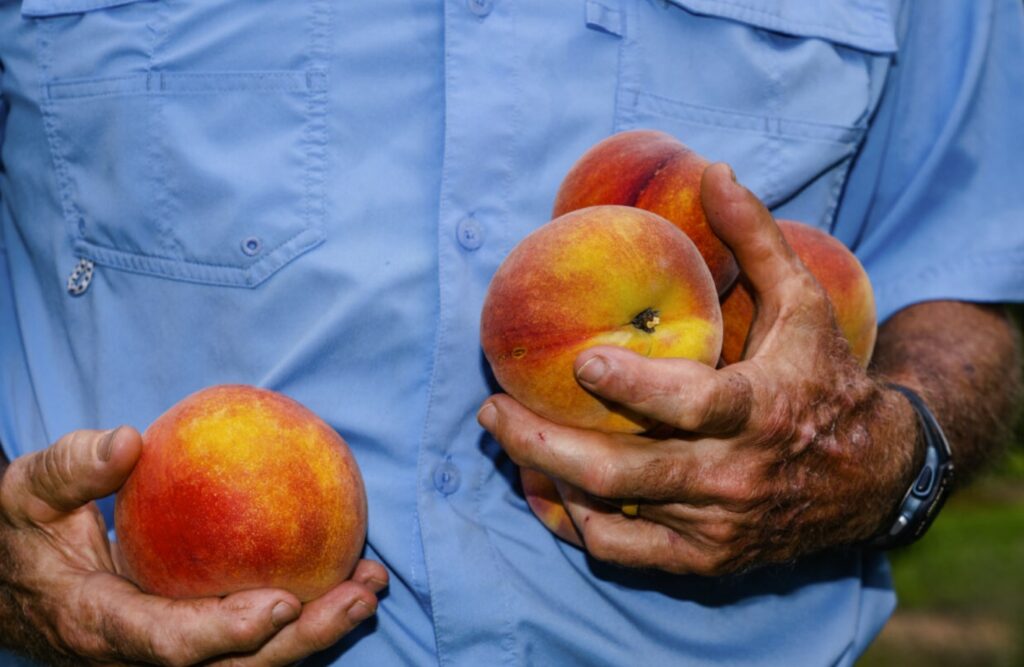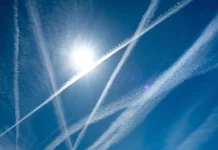
Summer is around the corner, and in Georgia, summer means peaches.
But horticulturists at the University of Georgia say roughly 90% of the Peach State’s crop has been destroyed by bad weather and a warming climate.
The last time things were this bad was 1955, according to Lawton Pearson of Pearson Farm in Fort Valley, Georgia.
“I didn’t see it. I wasn’t alive,” Pearson says. “My dad was only six. My grandfather picked two peaches, and they went to California for the summer.”
Peaches require a minimum number of chill hours, below 45 degrees, to set fruit. But the first three months of this year were the warmest on record in Georgia, and chill hours here have been declining over the years. That’s due to climate change.
Growers are experimenting with new varieties that need fewer chill hours. Some of those varieties did get the cold they needed this year. But right when they were blooming, a spurt of unlucky freezing weather zapped the buds.
“You had a low-chill peach perfectly fine with this winter,” Pearson says. “It bloomed, then got four nights under 28 [degrees]. You can’t win either way.”
Dario Chavez, an associate horticulture professor at the UGA who specializes in peaches, says around the state, between 85 and 95% of the peach crop was lost.
So don’t count on sinking your teeth into a peach from the Peach State anytime soon.
“Not Georgia peaches,” Pearson says. “I don’t think you’ll see Georgia peaches in the grocery store.”
Pearson’s summer staff will be down to 40 from the typical 250. He can’t retreat to California for vacation like his grandfather did back in 1955. The business has diversified since then, including a growing pecan crop.
But Pearson says looking at trees with no peaches is painful.
One bright spot? The few peaches that make it benefit from having all the sun, water and nutrients to themselves.
“The peaches you’re left with are fantastic and huge and sweet,” Pearson says. “It leaves you wanting more.”
Pearson says he’s ready for August when the peach season is over and he can look to next year. [WABE]
FUNDRAISING: KEEP STRANGESOUNDS ONLINE!… THANK YOU FOR YOUR HELP! You can give through Credit cards, Debit cards and Paypal by using the form below. (You will get a gemstone gift for every donation above 50$! Send me your snail mail per e-mail)
You should also join my newsletter…YOU WILL LOVE IT…
Some products I recommend you to add to your preparedness plan to help and protect you and your family during an emergency:
- Protect your home and car with the best lightning and EMP protection available…
- Always filter your water at home: Use this filter to drink clean water at home!
- Health Ranger Store: Stock up on preparedness food and products to be ready for the next emergency disaster…
I recommend following Qfiles for videos, podcasts and a wide compilation of alternative news…














Can’t say I’m surprised by this.Peaches only grow in certain climates.The most consistent areas are inland northwest for georgia.
Note
I was always perplexed that Georgia was known for peaches since they don’t have the best growing conditions for them overall.
Furthermore don’t fret if it stays warm they could always plant citrus trees.
West slope Colorado peaches are the world’s best.
Its a judgement from God.
Yeah, but who’s changing the climate?